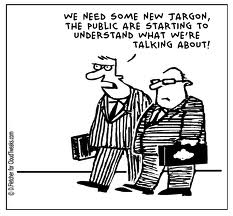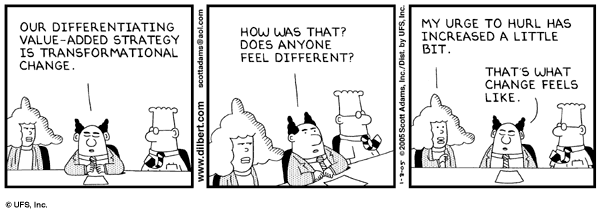Running a consulting firm requires constant networking, so I take advantage of any opportunity to distribute business cards and make new connections. I even passed a stack down the table at a family reunion this summer, hoping fresh leads would come of it.
So far, none have. But my action prompted a conversation with my aunt, who called me over, sat me down, and asked politely, “What do you do – I mean, really do?”
I let out a sigh and began to run through the various and sundry services my company offers—no easy task without either overgeneralizing [read: jargon], or dragging on for far too long. After a sentence or two, my aunt interrupted me: “Ah! I’m gonna puke if I hear any more of that business jargon – synergy, development, strategies…”
Point taken. There’s a lot of jargon – in churches, businesses, and anywhere people form networks. It can be difficult to break free from the preferred lingo of the inner circle, the select terminology of a particular market niche, and speak “normally” to someone who could care less about the exclusivity of your particular group.
 That memory came to mind when I saw “Weird Al” Yankovic’s Mission Statement song (click here). If you’ve ever found yourself rolling your eyes after hearing a phrase like “assertively reintermediate vertical process improvements,” you’ll get a belly full of laughs from the song.
That memory came to mind when I saw “Weird Al” Yankovic’s Mission Statement song (click here). If you’ve ever found yourself rolling your eyes after hearing a phrase like “assertively reintermediate vertical process improvements,” you’ll get a belly full of laughs from the song.
And Weird Al is right, to an extent. I don’t advise my clients to log on the Corporate BS Generator to create their vision and mission statements, or to shorten their core values. Well, I do, but only so they know what not to say, and how highfalutin, pretentious and ridiculous their compilations sound.
I mean, do you really think you can get on an elevator, speak with a business colleague or potential client, and have “credibly actualize optimal ‘outside the box’ thinking” come out of your mouth? Try memorizing something like that and accurately recalling it in the heat of the moment. In real-life situations, most people have trouble remembering a good pitch.
Here’s the not-so-secret secret to a concise, understandable pitch. Know your idea. The core idea. And maybe a tagline. Something like “democratizing analytics” is way easier to remember, repeat, and employ than “empowering the common man with the statistical and analytical tools necessary for data-driven decision-making.” But it basically means the same thing.
It took all of three minutes to come up with the long version and somewhere between hours and months to think of the short one. Communicating your idea is a refining process that takes a lot of time and experimentation, and it all starts with (you guessed it) jargon.
Business jargon makes sense if you live it. While needlessly complicated to outsiders, the words always seem to fit together so well when on the inside, falling into place, as Winston Churchill once said, “like pennies in the slot.”
Jargon enables users, handlers, and members to communicate concisely, exactly, professionally.
Yet don’t expect someone to understand your idiosyncratic jargon if they don’t move or work in your (no doubt insular) corner of the market. There’s nothing more annoying than club talk outside of the club.
Jargon still has value, though, if used in the right time and place, and with the right audience. It can help clarify ideas, simplify them, and make them “sing” with a distinctive flair.
So don’t be scared to use jargon—it’s necessary and useful for transforming your initially complex, amorphous idea into a cohesive, generally understandable thing.
My second bit of closing advice: Competently mesh interoperable value so as to fungibly monetize enterprise-wide thinking.
Master this, and you will succeed.


